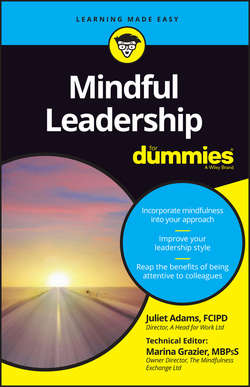Читать книгу Mindful Leadership For Dummies - Adams Juliet - Страница 7
На сайте Литреса книга снята с продажи.
Part 1
Breaking the Mould
Chapter 2
Discovering Why Mindfulness Matters to Leaders
Identifying Sources of Pressure
ОглавлениеThe ability to work under pressure is an important leadership attribute. Although you can’t micromanage the curve balls that life throws at you, you can manage how you deal with them.
The following sections differentiate pressure from stress, help you identify how excess pressure can lead to stress and explore specific aspects of leadership stress.
Defining pressure
Pressure, up to a certain point, can have a positive impact on your performance. It provides the motivation to get out of bed in the morning. It can make you more alert, motivated and engaged, encouraging you to become the best you can and to reach a level of work that constitutes your peak performance. For those in leadership positions, levels of pressure experienced can be great. When holding a position of responsibility, everything that you say and do has the potential to influence the lives of others. Each decision you make affects not only your organisation but the people around you.
Defining stress
When pressure becomes excessive or unmanageable, it leads to stress. Stress can damage your health, performance, and even your business. Arguably, stress has been the cause of more poor business decisions than poor judgment or inexperience.
Stress experienced for short spaces of time is normal and to be expected. In recent times, the combination of the economic downturn and unstable financial markets has increased workplace stress for many leaders. Every decision and action can become even more critical as the pressure grows to do more with less while maintaining the current level of performance.
Stress can affect all staff at all levels. In the United Kingdom, the Health and Safety Executive reported that in 2014, stress, anxiety and depression accounted for 39 per cent of workplace absence. In the United States, the current cost of workplace stress is estimated at $300 billion a year, 73 per cent experience the psychological symptoms of stress, with around 33 per cent living with extreme stress.
Stress can cause impaired judgment, a lack of foresight, detachment from reality, irresponsibility, and strong egoism. This impaired brain function can prevent leaders and decision-makers from making good decisions and cause them to neglect the interests and needs of the business and wider society in pursuit of personal egoistic benefit.
Identifying sources of pressure that can lead to stress
Knowledge is power. If you want to reduce your stress, start by identifying possible causes of excess pressure at work. In the United Kingdom, the Health and Safety Executive (HSE) identify a number of factors, which, if not managed correctly, can lead to workplace stress.
Consider whether any of the following may be potential sources of workplace stress for you:
❯❯ Demands: A feeling of inability to cope with the demands placed on you by your job
❯❯ Control: A feeling of lack of control in the way you do your work
❯❯ Support: A feeling that you’re not receiving adequate information and support from your colleagues and superiors
❯❯ Relationships: A feeling that you’re being subjected to unacceptable behaviours from those you work with
❯❯ Role: A feeling that you don’t adequately understand your role and responsibilities
❯❯ Change: A feeling that you’re unable to contribute to or shape organisational changes that impact you
Although you may not always have control of situations you encounter at work, you do have control of how you respond to them. Consider what you can change and the things you can’t, see whether you can identify your thought patterns around them, and actively work to find alternatives that invoke less stress and help you function better as a leader.
Recognising power stress
A recent research study suggests that leaders experience less stress than their subordinates because they tend to have more control over situations, however, leadership can have its own unique stresses. One leader confided in Juliet that he only ever experienced stress at two points in any given 24 hours: night and day!
Leadership involves increased responsibility, working with ambiguities, pressure to achieve results by influencing others, and loneliness, each of which can take its toll. As a result, leaders may experience power stress, a term coined by Boyatzis and McKee. Power stress can result from the exercise of influence and sense of responsibility experienced in many leadership positions. If it isn’t identified and addressed adequately, it can lead to physical and emotional exhaustion.
The chronic stress that can accompany leadership has been connected to a wide range of diseases and dysfunctions. It can also lead to a state of dissonance, which can drain your enthusiasm and energy. Power stress experienced as a result of being in a leadership position isn’t really the problem; a lack of a sense of completion when you complete tasks and projects and insufficient recovery time are.
Although work pressure and stresses may not relent, you can take steps to change the way you choose to respond to them. Mindfulness is a key component of the renewal process.
